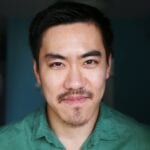As the first gathering of the Across fiction series was about to begin on May 9 in downtown Toronto, Tom Cho quietly lamented how few people sat in the audience.
I couldn’t tell if Cho was anxious. As an author with an established following in his native Australia, he had done fiction readings many times before, and besides, the audience was still shuffling in. Still, maybe the nerves were to be expected of someone trying to establish an audience in a new country.
Not moments before, Cho and I had dashed over to the Church of St Stephen-in-the-Fields, the site of the reading, from a nearby restaurant. Between the occasional slurp from his bowl of noodles, the author of Look Who’s Morphing, which is making its North American debut after being published to acclaim elsewhere, told me about finding success as a queer writer in his hometown of Melbourne. Cho also spoke about racism and starting a new life in a different hemisphere.
Xtra: Did you think that Look Who’s Morphing would be so well received? Was it always the plan to bring it to an international audience?
Tom Cho: I definitely wrote the book for a world audience. I had an intuition of writing this book with a central theme of personal identity, and it touches on other types of identity, too. Sexual identity, gender identity, racial identity, as well. I felt that the themes would have resonance for audiences outside of Australia.
You are currently applying for permanent residency in Canada. What made you choose to move to Toronto? How do you find the new environment?
I first did an artist residency in Japan in 2011. It was an amazing experience for someone born and raised in Australia. It felt strangely comforting to be surrounded by all these people from East Asian backgrounds.
But being a writer, I felt I needed to go to a country that was predominantly English speaking. I really like the ethnic diversity of Toronto and how that has translated into me finding networks of like-minded people, including queer and trans folk of colour.
But I don’t have this utopic view of Toronto either; there is racism in this queer community also. The whiteness of the advertising in the gay male world, the racism that you find in gay male personal ads — this doesn’t seem to differ that much from Melbourne.
How does your Asian identity inform your writing or the way you experience queer culture?
I have experienced my fair share of exclusion in my life and some of it has been due to my ethnic background, so it’s no coincidence that I decided to draw from that.
In terms of desire, someone can go out and have sex with someone else — that engagement will always have a racial character. It’s just that some people have the luxury of not bringing it to the fore. They don’t have the proximity to experiences of racism people of colour can have.
How would you respond to the idea that as a community we are more socially conscious because of the discrimination we have faced?
Sadly, I think it’s a naive question. We would be kidding ourselves if we thought we could quarantine ourselves away. The queer community is not some homogenous mass of people who only experience life through their queerness. People who are in positions of power, who enjoy certain forms of privilege, can easily settle for what they have.
Look Who’s Morphing North American launch
Thurs, May 15, 7:30pm
Venus Envy
226 Bank St
tomcho.com

 Why you can trust Xtra
Why you can trust Xtra


